My hurriedly written obituary of Graham was published in the Guardian on 10th September.
A copy is online here. I found the news of his sudden death distressing.
author of The Prestige, The Separation and the story collection Episodes
My hurriedly written obituary of Graham was published in the Guardian on 10th September.
A copy is online here. I found the news of his sudden death distressing.
When I was still a teenager, in search of cheap thrills (as I hoped and expected), I bought a Penguin paperback edition of Stan Barstow’s novel A Kind of Loving (1960). I remember enjoying it – but not for the sexy bits, which were few and far between and in their depiction of youthful callowness a bit too close to home to be either educative or erotic.
The film directed by John Schlesinger came out soon afterwards. The sexy bits in this were a bit more explicit (though not much more). I was interested to see that many of the exterior shots were filmed in Stockport, a depressing post-industrial town close to where I lived as a child. For some reason the Luftwaffe had failed to flatten Stockport, so its terraced slums and empty mills and former factories remained standing until at least the early 1960s. IMDb describes some of the filming locations as ‘Greater Manchester’, which I think now includes Stockport. I’m certain that the final scenes in the film were shot in a place called Gas Lane, next to the gasworks and close to Mersey Square in the centre of the town, which even in the context of Stockport’s neglected Victorian areas was picturesquely decrepit.
(I suppose I should add that since those days Stockport’s slums and horrible old gasworks have all been demolished, and it has no doubt become a lovely place to live.)
Stan Barstow, a good writer if somewhat neglected these days, was one of those post-war novelists dubbed by the press ‘angry young men’. They were the immediate literary context in which I began writing: I read several of the books then current, by John 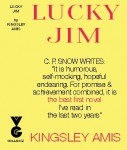 Braine, Alan Sillitoe, Keith Waterhouse, David Storey and, of course, Kingsley Amis. His novel Lucky Jim (1954) is often said to have started that particular literary genre, even though it is different in tone from all the others, and a distinct cut above them. Although it is by far Amis’s best-known novel, and probably brought him more money than any of his others, it is not in my view his best. Some of his later novels are written more subtly (unsurprisingly), and in many cases are much funnier and their satire is more effective. However, it remains a favourite from that period.
Braine, Alan Sillitoe, Keith Waterhouse, David Storey and, of course, Kingsley Amis. His novel Lucky Jim (1954) is often said to have started that particular literary genre, even though it is different in tone from all the others, and a distinct cut above them. Although it is by far Amis’s best-known novel, and probably brought him more money than any of his others, it is not in my view his best. Some of his later novels are written more subtly (unsurprisingly), and in many cases are much funnier and their satire is more effective. However, it remains a favourite from that period.
The other day I bought a secondhand hardback of Lucky Jim on the internet. Not a collector’s item in the 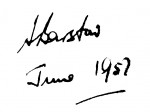 usual sense (it is from the twelfth impression, printed fifteen months after the first edition), but a nice copy in undamaged binding. I was pleased to find it. I was even more pleased when it arrived in the mail: from the inscription inside the front cover it turns out to have been Stan Barstow’s own copy.
usual sense (it is from the twelfth impression, printed fifteen months after the first edition), but a nice copy in undamaged binding. I was pleased to find it. I was even more pleased when it arrived in the mail: from the inscription inside the front cover it turns out to have been Stan Barstow’s own copy.
Everything joins up in the end.
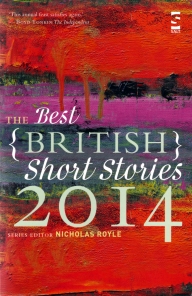 There are twenty short stories in this anthology: nearly all of them are good or interesting or unusual, deserving to be in a book with this title, nearly all are by writers whose work I had not previously come across. The publisher is Salt, the editor is Nicholas Royle.
There are twenty short stories in this anthology: nearly all of them are good or interesting or unusual, deserving to be in a book with this title, nearly all are by writers whose work I had not previously come across. The publisher is Salt, the editor is Nicholas Royle.
Three of the stories are of outstanding quality, each one of which would alone justify the cost of buying the book.
“Getting Out of There” by M. John Harrison (first published as a chapbook by Nightjar Press – a Nick Royle imprint), is a story set in what sounds and feels like my former hometown Hastings. The sceptical, defensive mood of the seaside town on its uppers is accurately if selectively caught. The two characters have a marginal, edgy, entirely believable relationship, fleetingly based on knowing each other years before when they were kids. They both reek of authentic Hastings-ness. Mike Harrison is writing better than ever. His reputation seems overshadowed by his contemporaries – Kureishi, Swift, McEwan, etc – but they are shallow, minor, facile writers in comparison.
“The Faber Book of Adultery” by Jonathan Gibbs is the first story in the book, and it set a standard I thought would be difficult to match in what followed. A middle-aged writer seduces (or is seduced by) his best friend’s wife. They do it standing up, leaning against a bookcase. Perhaps that makes the story sound unoriginal, but the delicacy and natural observation of the writing makes the story exceptional. The sub-text is the man’s rambling, almost disorganized thoughts about books, the adultery that is always in them, the way adultery is written. Books are sexy. I particularly liked the description of a book pulled away from a shelf that is too tightly packed with titles: “When it came free, almost with a pop, the books alongside seemed to sigh into the space it left, their pages filling with air.” The story was first published in Lighthouse 1.
The book concludes with a story as good as, or even better than, the Gibbs. It is “Barcelona” by Philip Langeskov, first published by Daunt Books. A man plans a surprise anniversary celebration for himself and his wife, in Barcelona. In spite of several minor worries and problems – pre-existing plans, lost baggage at the airport, the presence of his wife’s former lover in Barcelona, a sudden illness – they arrive there more or less intact, and the holiday goes ahead. It is another story about the effects of literature: Langeskov riskily summons the ghost of Graham Greene, specifically in a short story he reads on the plane, “The Overnight Bag”, which describes a not dissimilar European flight. The uncertainties of the Greene story resound through the visit to the Catalonian city. I think the risk Langeskov took came off: “Barcelona” is a sort of post-Greenean study of a loving marriage, with its nervous ambiguities and shadows. From beginning to end the reader senses unease, things about to go catastrophically wrong, the impact of the past not fully comprehended.
The Best British Short Stories 2014, edited by Nicholas Royle. Salt Publishing, 2014, 240pp, ISBN: 978-1-907773-67-9, £9.99
A man is seeking an appointment he has to keep. He is inside a vast modernist structure, made of concrete and glass, with unsignposted stairwells and unobliging elevators. Other people are present: tourist groups, businessmen, transient visitors. Meeting rooms have long tables and reconfigurable walls to make the rooms into whatever size, shape and function is necessary. Abstract paintings hang on every wall. Members of staff are present, unfailingly courteous and blandly unhelpful. There are hints and suspicions of close personal contacts: rooms where people are eating, where there is a dance floor, where bedroom doors are firmly closed and labelled Do Not Disturb. Offices are glassed-in, or set up as boxed workstations. A motorway runs past. Could this be a hotel? Or a hospital, an office block, an airport terminal, a convention centre?
The images come from a masterpiece of the cinema, these days a forgotten and largely unseen one: Playtime. Three years in the making, and then delayed by several post-production snags, Playtime was eventually released in 1967, starring and directed by the French comedian Jacques Tati. It was then the most expensive film ever made in France, but it did not receive the worldwide success it needed to recoup the expense of filming, and Tati was bankrupted by it. It is rarely seen these days. Although Playtime is available on DVD, the original 70mm frame is cropped, and there have been cuts made to the immense running time. However, with the hindsight of nearly half a century it can be seen as a brilliant foresight into the worst and most soulless aspects of our modern life.
Playtime was made at roughly the same time as two other comparable French films – Jean-Luc Godard’s Alphaville (1965), and Chris Marker’s La Jetée (1962), although the delays meant it came out some time later. All three films have a distinctly Ballardian flavour – not a coincidence, because J. G. Ballard’s work has always been highly regarded in France.
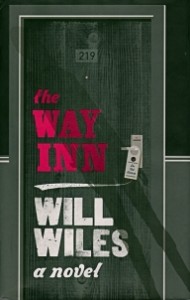 To say that Will Wiles’s new novel The Way Inn is strongly reminiscent of Playtime is intended as a compliment. The narrator, the protagonist, has the symbolic-sounding name of Neil Double. Double is a professional conference-goer, standing in for middle-grade executives who either do not want to go to the conference, or cannot. He attends the symposia on their behalf, takes notes and reports back. This is his job, and he moves from one hotel and conference to the next, frequently running into the same individuals, and always encountering the same types of people. He has relationships with some of them: he knows which of the other attendees are bores or pests, and he is constantly interested in the women he tries to pick up.
To say that Will Wiles’s new novel The Way Inn is strongly reminiscent of Playtime is intended as a compliment. The narrator, the protagonist, has the symbolic-sounding name of Neil Double. Double is a professional conference-goer, standing in for middle-grade executives who either do not want to go to the conference, or cannot. He attends the symposia on their behalf, takes notes and reports back. This is his job, and he moves from one hotel and conference to the next, frequently running into the same individuals, and always encountering the same types of people. He has relationships with some of them: he knows which of the other attendees are bores or pests, and he is constantly interested in the women he tries to pick up.
However, Double’s true passion is hotels. He loves hotels, everything about them: the furniture, the abstract paintings, the cuboid armchairs, the TV screen that displays an electronic welcome, the hum of the air-con, the room-service pan-seared salmon, the electronic door key that stops working if you carry it next to your mobile phone, and so on. He also relishes the environment of the modern business hotel: the adjacent motorway, the half-constructed new buildings next door and the muddy areas which will be developed next, the vast parking lots, the nearby airport and its lights, the attached conference centre that can only be reached by courtesy bus. Wiles describes all this with economy and precision, almost a litany of the details of that over-familiar if faintly repellent world of the chain hotel. Anyone who has stayed at the Radisson next to Heathrow Airport (location of several SF conventions in recent years) will recognize the endless corridors, the mile after mile of corporate carpet, the soundproofed windows, the view from those windows across concrete to nothing of human scale, the ease with which you can get lost in the identical corridors and landings and the concomitant habit of always taking the same, safely memorized route to your room, the particular type of bland “international” cooking, the inoffensively abstract paintings, the sense of being surrounded by a Ballardian urban wilderness which you cannot enter or understand, and which will endanger you if you try to walk through it or traverse it.
I have summoned the spirit of J. G. Ballard a couple of times, not accidentally. The Way Inn strikes me as the first authentically post-Ballardian vision of the world as it has become and as it is going to continue to be. Towards the end of his career, Ballard produced a couple of social satires: Millennium People (2003) and Kingdom Come (2006), with discernable elements of social satire in the two much stronger novels that preceded them: Cocaine Nights (1996) and Super-Cannes (2000). Will Wiles has taken up the satire where Ballard left off, while joyfully reviving memories of the great Ballard novels from an earlier period: The Drowned World (1962), Crash (1973) and Concrete Island (1974).
There are also Ballardian echoes in the way Wiles characterizes women (in particular the dominant, Amazonian and sometimes enigmatic figure of the hotel para-manager Dee) – there is a constant sense of male sexual awe, without anything ever happening. (Not true of Crash, though!) Wiles’s dialogue too has that odd Ballard characteristic: an errant, oblique, declarative, almost shouted way of coming at you, non-realist but also mundane and worldly. It gives the novel the weirdest feeling, a sense that there is more going on than you think, and then you find out that there is. The final Ballardian touch I will not spoil, as the pleasure in revealing it should be Wiles’s, not mine, but I was reminded happily of one of Ballard’s Borgesian short stories published in 1982. I’ll leave it to others to trace the reference, but to narrow the search the story I’m thinking of was included in his collection War Fever (1990).
I loved The Way Inn, read it with endless pleasure and interest, and am delighted that in this year, apparently doomed to be eponymed by a class of emergent young science fiction sensation-mongers, a mature, expert and wonderfully original talent has appeared in the person of Will Wiles. For me, The Way Inn is the most satisfying and radical new novel I have read so far this year, way ahead of the rest.
The Way Inn by Will Wiles, Fourth Estate, 2014, 343pp, ISBN 978-0-00-754555-1, £12.99
Here is my (revised, final) programme schedule for the London worldcon, Loncon 3. We are planning to arrive on Thursday afternoon, 14th August, leaving on the Monday morning. Nina has listed her own programme items here – there is only one unfortunate clash of same-time scheduling between us (13:30 on Sunday). Everything in italics is from the convention’s schedule.
Friday 14:00 – 15:00 (London Suite 5; ExCel) – Kaffeeklatsch
Christopher Priest, Justina Robson
Friday 18:00 – 19:00 (Capital Suite 7+12; ExCel) – In Conversation: Naomi Alderman and Christopher Priest
Every 10 years, Granta publishes a list of “The Best of Young British Novelists”; and every so often, a writer whose work includes the speculative and fantastic gets included. Christopher Priest was included in the 1983 list, while Naomi Alderman made the 2013 list; for this item they will discuss their work and careers, and ask to what extent literary values and attitudes to “genre” stories have changed over time.
Naomi Alderman, Christopher Priest
Friday 21:00 – 22:00 (Capital Suite 7+12; ExCel) – You Write Pretty
Beauty is in the eye of the beholder, they say, so let us behold some fine fantastical sentences. Our panel have each picked a sentence, and will have a chance to make their case for why theirs is the fairest of them all — but it will be up to the audience to decide.
Geoff Ryman (Moderator), Greer Gilman, Frances Hardinge, Christopher Priest, E. J. Swift
Saturday 12:00 – 12:30 (London Suite 1; ExCel) – Reading: Christopher Priest
Christopher Priest
Sunday 11:00 – 12:00 (Capital Suite 16; ExCel) – Becoming History
In a review of Kate Atkinson’s Life After Life, John Clute wrote, “It is not easy — it should not really be feasible — to write a tale set in twentieth century that is not a tale about the twentieth century.” A number of other recent books, including Peter Higgins’ Wolfhound Century, Christopher Priest’s The Adjacent, and Lavie Tidhar’s The Violent Century, are also ‘about’ historicising the near-past in this sense. How is the fantastic gaze operating on the twentieth century? Do we have enough distance to see it clearly yet?
Graham Sleight (Moderator), John Clute, Peter Higgins, Elizabeth Hand, Christopher Priest
Sunday 13:30 – 15:00 (Capital Suite 4; ExCel) – Looking Back On Anger: remembering 70s sf in the 21st century
Almost 30 years on from Jeanne Gomoll’s “Open Letter to Joanna Russ” , this panel will look at how the science fiction of the 70s is remembered today. Which works have stayed in the public eye, and which have faded away? Whose commentary still speaks to us, and what was the conversation like back then? What has proven to be problematic, and what remains unresolved?
Graham Sleight (Moderator), Jeanne Gomoll, Pat Murphy, Lesley Hall, Christopher Priest
Sunday 15:00 – 16:30 (Capital Suite 16; Excel) – SF and the English Summer
Summer is the time for picnics, discovering the countryside and falling through portals, a rainy summer day sends us into the far reaches of the old house. Winter brings mystery, spring brings sacrifice. To each season there is an adventure. The panellists will discuss the “traditional” English weather, its role in fantasy and the effect of Climate Change on our perennial topic of conversation. Bring your own umbrella and sun block.
Caroline Mullan (Moderator), Prof Euan Nisbet, Christopher Priest, Jo Walton
In 1967 I was living in a small basement flat in Fulham Road, London. One of the people who lived there too (I shrink from the word ‘flatmate’) was the millionaire publisher, Felix Dennis, who died at the weekend. He was neither a millionaire nor a publisher when I knew him, but a drummer in a band.
The flat was close to the epicentre of what the American press called ‘Swinging London’, and all that hippie and flower-power stuff now identified with the 1960s was going on around us. Most of it passed me by: I wanted to be a writer and was wrapped up in that, endlessly working at my typewriter.
There were four of us originally living in the flat: myself and Graham Charnock, and two others (who remain nameless). When one of these other two could stand living there no longer (he was having to share a room with the second unnamed one, another millionaire-publisher-to-be, for whom the phrase ‘personal hygiene’ would be entirely inappropriate), Felix Dennis took his place. After that, Graham and I had living with us two people who never cleaned anything, never washed themselves, never flushed the toilet or ever changed their underclothes. I already knew Dennis as a regular visitor to the flat, sometimes staying over: he was uncouth, scruffy and unintelligent. He had a sly, aggressive and cunning manner. He was a heavy drinker and a persistent user of drugs. A few weeks earlier we had had a burglary at the flat, which the local police never solved but said it had all the signs of an inside job. Graham and I were both opposed to Dennis moving in, but there were no alternatives. He came in, bringing his faux-hippie lifestyle and mates with him. Life in the flat quickly became untenable, and a few weeks after Dennis’s arrival I too moved out, but not before a rapidly deteriorating situation culminated on one memorable night, with Dennis threatening me and Graham Charnock with a knife.
He later became famous in the media when he and two others were charged with several offences, including conspiracy to corrupt the morals of minors (for which he was found not guilty) and an offence under the Obscene Publications Act (for which he was jailed). The conviction was later quashed on appeal. He went into magazine publishing and rapidly became rich. During the 1980s I was running a small software company with David Langford, and part of my job was to buy advertising space in computer magazines. We had a monthly spend in the thousands of pounds. I routinely received canvassing phonecalls from advertising departments at these magazines, but whenever one of the calls was from a Dennis magazine I invariably refused to buy space. Because we were advertising everywhere else, one day I took a call from the advertising director at Dennis Publishing – she wanted to know why we would not advertise with them. ‘Because in 1967 your boss tried to murder me with a knife,’ I said. The hilarious reaction from this hapless woman was, to say the least, intriguing. Later, when she was back in control of herself, she said in an understanding voice that we would never be bothered again. We weren’t. In 2008 Felix Dennis bragged to a reporter from The Times that he had murdered a man by pushing him off a cliff. When it became clear that the police were interesting themselves in the incident, Dennis hastily withdrew the claim, saying he had been drunk when talking to the newspaper.
He later became known as a philanthropist, tree-planter and poet. I have no knowledge or opinion of any of that. He suffered some terrible illnesses in later life, and in recent years was a victim of throat cancer, which eventually killed him.
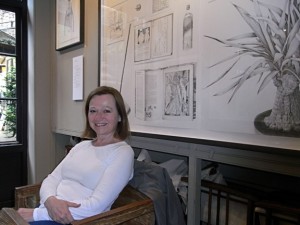
The artist Fay Ballard has an exhibition in London called House Clearance. This consists of a large number of touching and beautifully executed drawings and paintings inspired by the familiar clutter she found when clearing out the house of her father, J. G. Ballard. We were fortunate enough to visit the gallery yesterday, where Fay herself was present. Although I had met her father several times over the years, I had not met Fay before and it was a great treat to sit in the peaceful gallery and hear her memories of life at home with him.
Information about the gallery Eleven Spitalfields can be found here — the exhibition is continuing until 27th June 2014. And Fay’s own website has many of the images to be glimpsed online — but are no substitute for seeing the originals.
My new publishers in the USA, Titan Books, are doing a great job of finding my latest books some publicity. For the last month or so I have been slogging away at one interview after another. Although there is inevitably some overlap in the questions, considering that most of the interviewers had to think up their queries ‘blind’ there is a surprising amount of diversity.
As well as interviews, Tom Green at Titan also gained some space for me in the Huffington Post. So for once I feel my books have a fair chance of making a tiny impression on the greatest reading market on the planet.
Here are links to the interviews which have been published so far. I don’t expect anyone to read all of them, but here they are. Others are in the pipeline, so I will add to the list from time to time.
Titan Books themselves.
And the essay in Huffington Post.
Thanks to Tom Green, and all at Titan!
Just back from a week in France, where I was serving on the competition jury of a film festival in Tours, called Mauvais Genre. (‘Bad, Evil or Wicked Genre’: these were all non-mainstream films, some horror, some weirdness, some comedy, all broadly uncategorizable. The sort of films in fact that I love to discover.) This was the fourth festival jury I have been on, and watching movies all day can be surprisingly hard work. Enjoyable, though.
We watched nine movies in competition, plus two sets of shorts (courts métrages): eight live action films (worryingly, most of these depicted violent attacks on women: rape, torture and/or murder — can’t people think of stories any more?), and ten animated (these were of the highest quality, making a choice of winner really tricky). And any other out-of-competition films we cared to see as well.
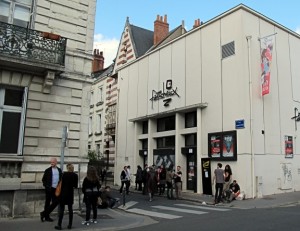
The main competition turned out to be a bit of a problem, because as one film followed another it was difficult to pick out a clear winner. The competition opened with a Dutch film called Wolf, directed by Jim Taihuttu: a long and exceedingly violent story in monochrome, about a young man just released from prison who tries to redeem himself through kick-boxing. For most of the rest of the festival I thought this would have to be the winner, because in spite of its sordid material it was professionally and expertly made, well written and performed with conviction … but for me it seemed to lack a quality that would lift it above the familiar round of on-screen beatings and deaths. The films that followed Wolf were unexciting: two ‘found footage’ horror films (unconvincing, unoriginal and not even good for a bit of fright), a German-made broad comedy set in a forest, an American comedy about casual burglars, a lightweight Swedish drama about mind control, a couple of lukewarm Asia Extreme films … nothing that was fresh or surprising or shocking or even written particularly well.
Then came the final entry, Der Samurai, a werewolf film from Germany. I confess the heart sank horribly at the thought – the title alone was enough to slow the pulse. But from the first frame the film looked quite unlike any werewolf film I had ever seen before. What followed was subtle, well acted, unusual, radical … it even had a subtext. The ‘samurai’ of the title was violent, unpredictable and frightening, but also oddly vulnerable. We on the jury gave thanks to Till Kleinert, director and writer, and with one dissension came to a quick choice of winner.
One morning I went to Instant Cine, an excellent DVD shop in the town, and with not much warning and no script I had to give an impromptu 3-minute recommendation of recent films I had seen. Here is the result:
The other people on the jury with me were three French actors: Yannick Solier, Sofia Manousha and Julien Courbey, and the ‘president’ of the jury was a porn-video actor called HPG (Hervé Pierre Gustave).
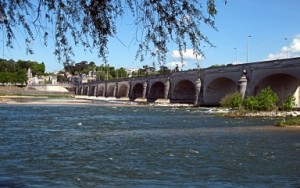 There were enough breaks between the films to explore the town, which has a modern commercial area and an attractive old centre, close to the Loire. The festival director was Garry Constant. He had been working on festival preparations all year. Everything went well.
There were enough breaks between the films to explore the town, which has a modern commercial area and an attractive old centre, close to the Loire. The festival director was Garry Constant. He had been working on festival preparations all year. Everything went well.
Then to an overnight stay in Paris, where I gave a talk and Q&A at a bookshop called Librairie Charybde (129 rue de Charenton, 75012 Paris). I was daunted by the large crowd who had turned out. They let me do the gig in English, which was to me a vast relief, but even so brought on the embarrassed suspicion that a French writer doing the same thing in London would be expected not to speak French. Charybde is one of those small bookstores that immediately you enter imparts the feeling that every book there has been selected for a reason, that it is an implicitly recommended title. For the hundredth time in my life I wanted to up sticks and move permanently to Paris.
Then home, and the inevitable piled-up backlog of emails and bills.
Late last week I received my first copies of Titan’s American editions of The Islanders and The Adjacent.

 The Islanders is published as a trade paperback — there never was an American hardcover, so this is the first edition in the US. The Adjacent is a beautifully bound hardback, with an eye-deceiving design on the cover and attractive typography inside. I’m delighted by both editions, and more glad than I can say to be back in the US market.
The Islanders is published as a trade paperback — there never was an American hardcover, so this is the first edition in the US. The Adjacent is a beautifully bound hardback, with an eye-deceiving design on the cover and attractive typography inside. I’m delighted by both editions, and more glad than I can say to be back in the US market.
This website carries a selection of reviews of both books: The Islanders here, and The Adjacent here. There is usually a link to the original text, so those of suspicious mind can check to see what amount of qualification and downright hostility has been omitted, no doubt entirely by accident.